![]()
|
Wedgwood & Co (Ltd) Enoch
Wedgwood (Tunstall) Ltd |
Location and period of operation:
|
Wedgwood
& Co (Ltd) |
Tunstall |
1860 |
1965 |
|
Enoch Wedgwood (Tunstall) Ltd |
Tunstall |
1965 |
1980 |
|
Earthenware manufacturers at the Unicorn Pottery and Pinnox Works in Tunstall, Stoke-on-Trent, England
NOTE:
|
Previously Podmore, Walker and Co
Taken over by Wedgwood Group and renamed Unicorn Pottery 1980.
[ see "Confused by Wedgwood?" ]
|
Unicorn Pottery and Pinnox Works "These were
large and important manufactories of general earthenware, situated in Amicable
Street and Great Woodland Street, ..... they were succeeded by Wedgwood
& Co, the head of the firm being Enoch Wedgwood. The goods produced were the higher classes of earthenware, in which dinner,
tea, breakfast, desert, toilet and other services, and all the usual
miscellaneous articles were made to a very considerable extent, for the home,
Colonial, Continental and American markets. The Unicorn Works were entirely devoted to the production of plain white graniteware for the American trade. Messrs. Wedgwood & Co. became a limited company in 1900 and continued to use this old title until 1965, when the new style Enoch Wedgwood (Tunstall) Ltd. was adopted to avoid the confusion which often arose between the old title (and marks) and that of Josiah Wedgwood & Sons Ltd." Jewitt's - Ceramic Art of Great Britain 1800-1900 |
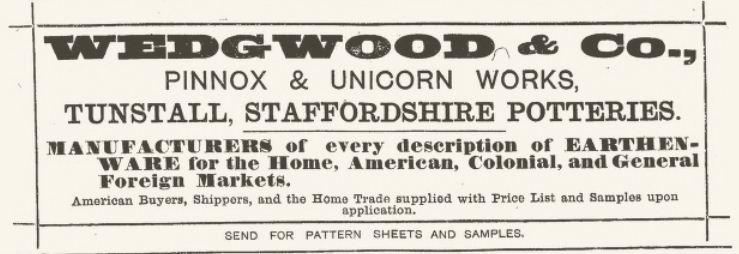
Wedgwood
& Co
Pinnox & Unicorn Works, Tunstall
The Pottery Gazette, American and Canadian Edition, January 1st 1880

Wedgwood
& Co
Pinnox & Unicorn Works, Tunstall
Printed
ware on white and Ivory, Decorated table, tea and toilet ware
WHITE GRANITE
The Pottery Gazette, January 1885
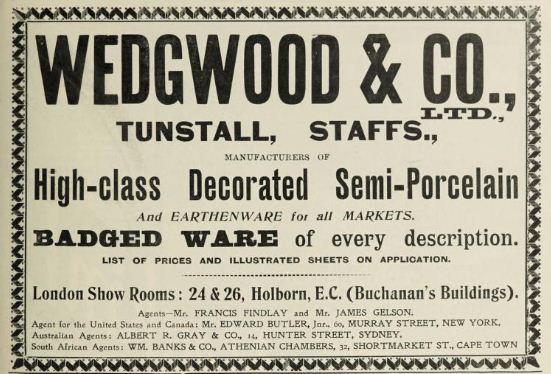
Wedgwood
& Co., Ltd
Tunstall, Staffs
Pottery Gazette - January 1906

Wedgwood
& Co
Tunstall, Staffs
Imperial Porcelain
The Pottery Gazette - January 1913
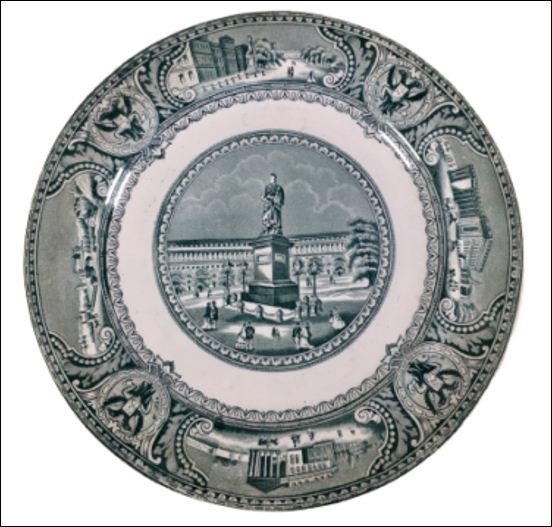 Transferware plate in the Woronzoff pattern
|
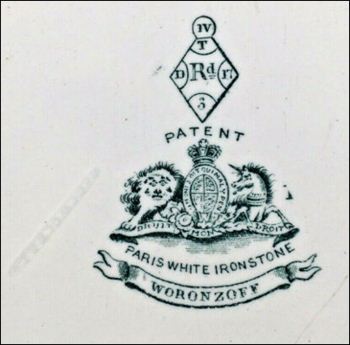 Paris White Ironstone Wedgwood & Co (impressed) The registration diamond gives a date for the registration of the pattern as 17the September 1867 This mark incorporates the Royal Arms
|
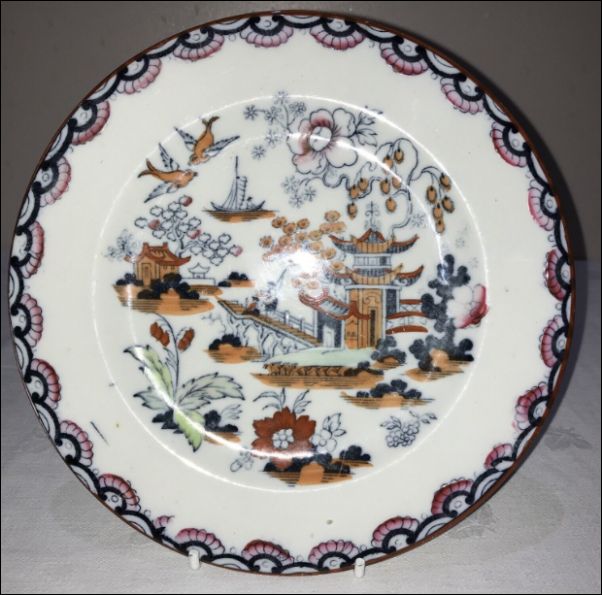 plate in the Chusan pattern - transfer ware with hand painted colour
|
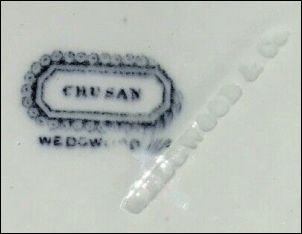 Wedgwood & Co c. 1860-90 |
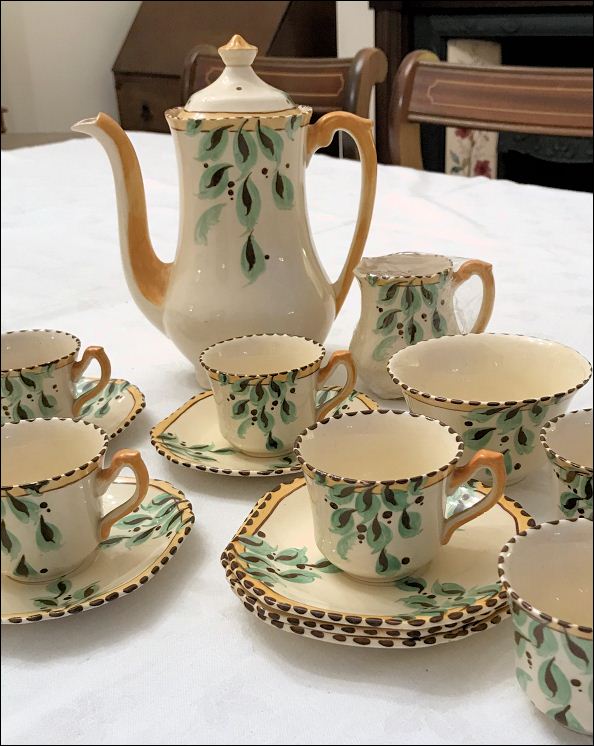
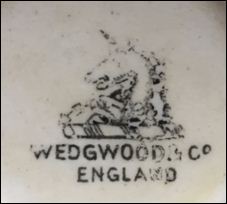
Hand painted coffee set
Wedgwood & Co, England
c.1862-1900
The
unicorn mark was introduced around 1862
'Ltd' was added to marks from 1900
photos courtesy: Clare Dingwall
|
typical colours of the Imari style |
c.1900-06 'LD' was added after c.1900
|
photos courtesy: Ed
Seeley
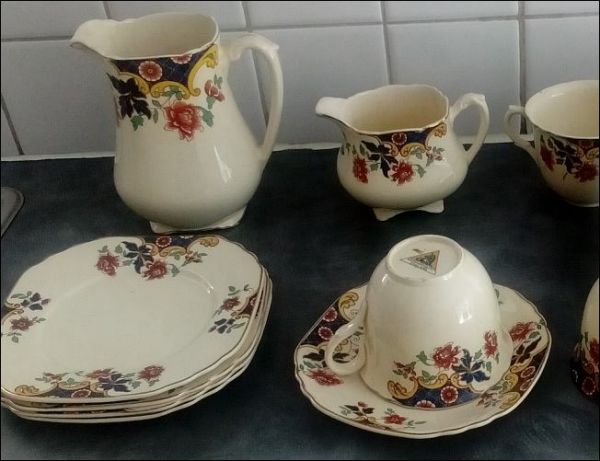 tea set in an unnamed pattern the marks shown appear on various pieces in the same set
photos courtesy: Robert Tree |
'IVORY'
is the style of the body The other impressed number is probably a workman's mark |
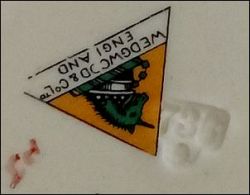 this style of printed mark was introduced in around 1936 the impressed mark 736 is the month/year of manufacture - in this case July 1936 The other impressed number is probably a workman's mark and the hand painted mark is a decorators mark |
Wedgwood & Co Character Jugs
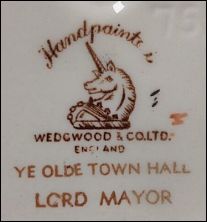 |
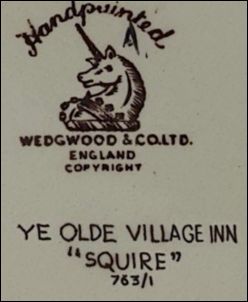 |
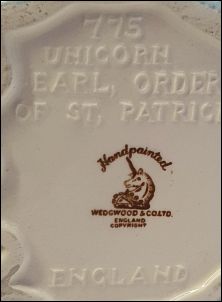 |
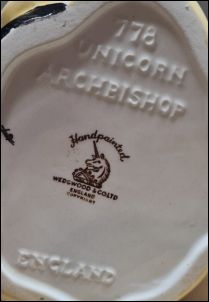 |
 Ye Olde Town Hall Lord Mayor pattern 753 |
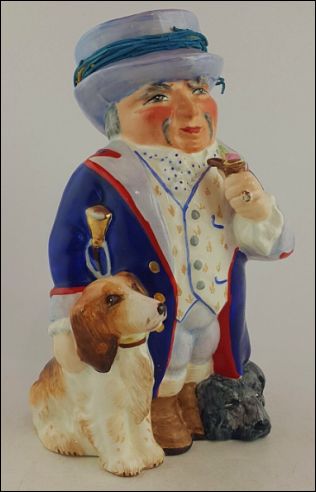 Ye Olde Village Inn Squire pattern 763 |
photo courtesy: Gordon Sutcliffe |
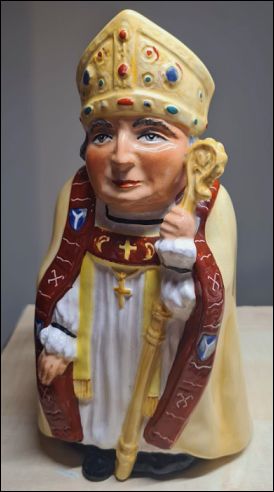 Archbishop pattern 778 |
|
Wedgwood & Co produced a range of good quality, hand painted Toby Jugs (more correctly Character Jugs). Some were grouped into a series - either 'Ye Olde Town Hall' or 'Ye Olde Village Inn', others stood alone or were obviously part of a series (such as Tinker, Tailor, Soldier...) but not specifically named as a group. The jugs were produced in two different sizes: around 5in (13cm) which were marked with a /1 after the pattern number and around 7in (18cm) which were marked with a /3. The overwhelming majority were jugs although examples are found where the character was also produced as a wall pocket. Occasionally the same piece would be produced with variations in the colour scheme. There were also some variations in the actual character, for example the Town Crier has two variations in the manner that the hand bell was moulded - this was probably to cut down on breakages during manufacture. Earlier examples of some of the characters didn't have a name printed on the bottom and so this has given rise to alternative (guessed) names - so the Beadle is sometimes called the Jailer and the Town Clerk is called the Tax Assessor. To add to the confusion occasionally the wrong name has been printed on the bottom so there are examples of the Town Crier erroneously marked as 'Town Clerk' and the Pedlar marked as 'Shepherd'
|
Ye Olde Town Hall
series:
Unclassified series:
|
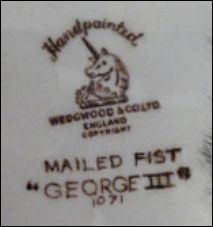
Mailed Fist
"George III"
1071 will be the pattern/design
number
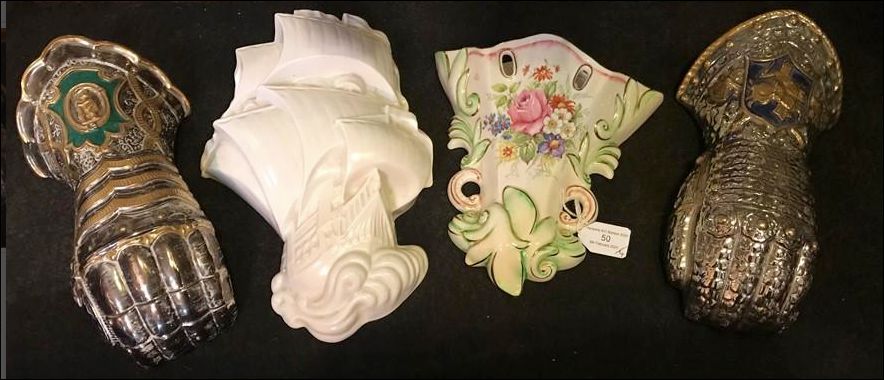
Wedgwood & Co wall pockets
| Four
Wedgwood and Co wall pockets, comprising 'Mailed Fist, Earl of
Leicester' 1077, 'Mailed Fist, George III 1071', both hand painted, one
with floral decoration and another in the form of a sailing ship, early
to mid 20th Century.
Courtesy: Hansons Auctioneers |
Marks used on ware for identification:
Marks are split into three date ranges (click for more)
| Wedgwood
& Co 1860-1965 |
Enoch
Wedgwood (Tunstall Ltd) 1965-1980 |
Unicorn
Pottery 1980+ |
Trade Names:
QUEEN'S IVORY
WACOLWARE
WACOL IMPERIAL
EVERWARE
ROYAL TUNSTALL
VITRILAIN
Ironstone Names:
IMPERIAL PORCELAIN
PARIS WHITE IRONSTONE
STONE GRANITE
ROYAL STONE CHINA
SEMI ROYAL PORCELAIN
WEDGWOOD & CO
(impressed mark, 1860+)
WEDGWOOD & CO. LTD.
(impressed mark, 1900+)
 Wedgwood & Co Standard name-mark used alone or incorporated in printed marks. Used alone - impressed. c.1860-90 |
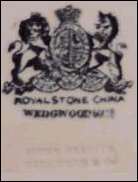 ROYAL STONE CHINA WEDGWOOD & Co. (printed) STONE
GRANITE This mark incorporates c.1860-90 |
|
c.1860+ |
marks with ENGLAND
are |
In 1900 the firm became a limited company - it can be seen from this example that the 'LD' is out of balance, it sticks out on the right - the 'LD' must have been added to the existing mark before new stencils were made |
the unicorn mark was registered as a trade mark in 1910 (although it was used prior to this)
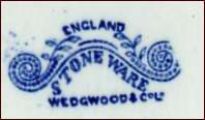 England Stoneware Wedgwood & Co Ld |
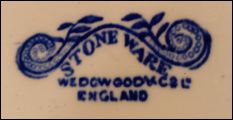
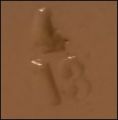 Stoneware Wedgwood & Co Ld England this mark on a Willow pattern plate with impressed Wedgwood & Co Ltd together with the manufacturing month/year of April 1913 |
variations of the Stoneware mark
'Ltd' or 'Ld' shows a date 1900+
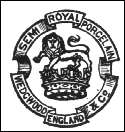 Royal Semi Porcelain Wedgwood & Co England c.1890-1900 |
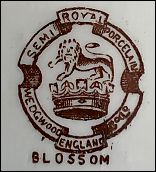 Royal Semi Porcelain Wedgwood & Co LD England c.1900-1906 'LD' was added c.1900 |
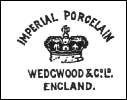 Imperial Porcelain Wedgwood & Co Ld England c.1906+ with or without |
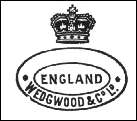 Wedgwood & Co Ld England c.1908+ often the name of the pattern is included |
 Wedgwood & Co Ld England c.1908+ the unicorn mark was registered as a trade mark in 1910 (although it was used prior to this) |
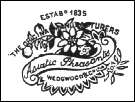 Estabd 1835 The original manufacturers Asiatic Pheasants Wedgwood & Co Ltd c.1925+ note: the introduction of "Estab 1835" It was the earlier company of Podmore, Walker & Co which was established around 1835 and are generally acknowledged as being the first producers of the 'Asiatic Pheasants' pattern |
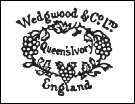 Wedgwood & Co Ltd Queen's Ivory England c.1925+
|
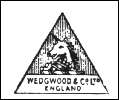
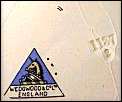 Wedgwood & Co Ltd England c.1936+
|
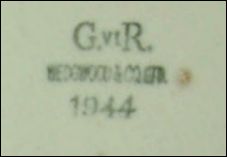
G VI R
Wedgwood & Co Ltd
1944
|
The mark shown indicates that the ware was produced for and supplied to the British Government; it was ultimately property of the Crown/Government, hence the GR-VI Cypher. This mark is there to distinguish the piece from being normal ‘utilitarian’ ware for public sale during the period surrounding the Second World War. Wedgwood & Co (and others) were given government contracts throughout the late 1930s and into the 1940s (WWII) and produced canteen ware - most likely for the armed services. The year of manufacturer is generally included. |
 WACOLWARE Made in England c.1951+
|
c.1952+ |
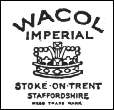 WACOL Imperial Stoke-on-Trent Staffordshire Reg Trade Mark c.1956+ |
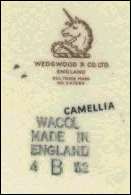
WACOL
Made in
England
4 B 52
the "4 52" refers to the month & year of manufacture
in this case April 1952
the letter "B" refers to the permitted class of ware produced under the
Wartime Concentration Scheme
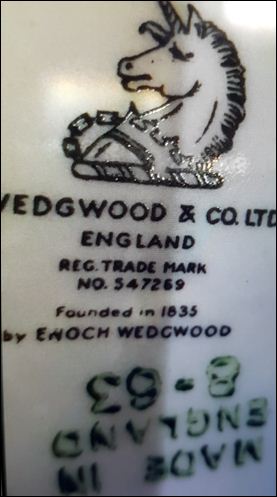
Wedgwood & Co Ltd
England
Founded in 1835
by Enoch Wedgwood
c.1952+
the "8-63"
refers to the month & year of manufacture
in this case August 1963
| It was the earlier company of Podmore, Walker & Co which was established around 1834 and in 1835 Enoch Wedgwood became a partner in the firm of Podmore, Walker & Co |
|
"These initials, AMS
occur in a bow knot type outline, on a dinner service made by Wedgwood & Co of Tunstall.
This service bears the registration mark for June 1880. The initials probably relate to the retailer." NOTE: the AMS mark denotes the retailer 'Silber & Fleming' - a number of North Staffordshire pottery companies produced ware for them. |
| In 1965 the company Wedgwood & Co. was sold to Semart Importing Co. based in New Jersey, USA and refloated as Enoch Wedgwood (Tunstall) Ltd. |
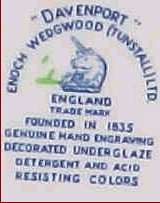
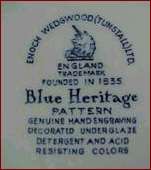
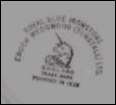
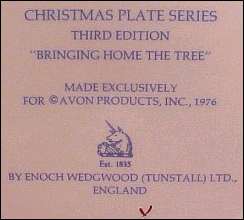
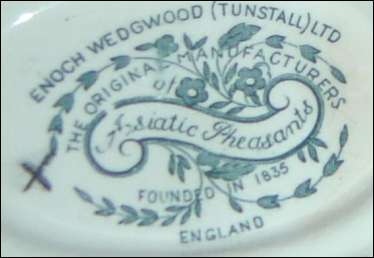
Enoch Wedgwood (Tunstall) Ltd
1965 - 1980
| In
1980 Josiah Wedgwood & Sons Ltd (who, up to this point had
nothing to do with Wedgwood & Co.) purchased Enoch Wedgwood and
it operated within the Wedgwood Group as the 'Unicorn Pottery'.
It is unclear when Josiah Wedgwood & Sons Ltd stopped producing ware under the Unicorn Tableware name. |
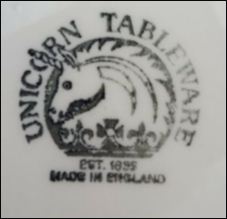
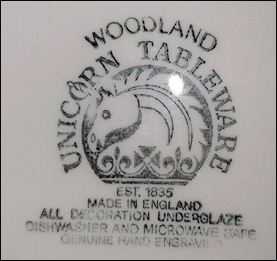
Unicorn Tableware
Est. 1835
Made in England
| It was not Unicorn Tableware nor Enoch Wedgwood & Co who were established in 1835 - it was the earlier company of Podmore, Walker & Co which was established around 1834 and in 1835 Enoch Wedgwood became a partner in the firm of Podmore, Walker & Co |
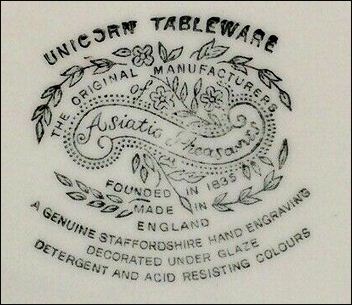
Unicorn Tableware
Est. 1835
Made in England
The earlier company of Podmore,
Walker & Co are generally acknowledged
as being the first producers of the 'Asiatic Pheasants' pattern
- click for information on the Pinnox Works -
Questions, comments, contributions? email: Steve Birks